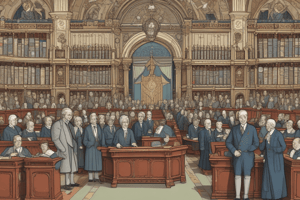Podcast
Questions and Answers
Which house of Parliament has the political party with the most votes choosing the Prime Minister?
Which house of Parliament has the political party with the most votes choosing the Prime Minister?
- Senate
- House of Commons (correct)
- House of Representatives
- House of Lords
In a parliamentary system, the head of government is directly elected by the voters.
In a parliamentary system, the head of government is directly elected by the voters.
False (B)
What is a major feature of the presidential system?
What is a major feature of the presidential system?
The president is constitutionally independent of the legislature.
A disadvantage of the presidential system is the possibility of ______.
A disadvantage of the presidential system is the possibility of ______.
How many electoral votes are needed to win the presidency?
How many electoral votes are needed to win the presidency?
What is the role of the President as Chief of State?
What is the role of the President as Chief of State?
Under the Impoundment Control Act 1974, the president must inform Congress if he decides not to ______.
Under the Impoundment Control Act 1974, the president must inform Congress if he decides not to ______.
Direct mandate means the president is elected by the legislature.
Direct mandate means the president is elected by the legislature.
Flashcards are hidden until you start studying
Study Notes
Parliamentary System Major Features
- The executive power is held by a cabinet comprised of legislature members, accountable to the parliament.
- Voters elect members to a bicameral parliament, consisting of the House of Commons and the House of Lords.
- In the House of Commons, the party with the most votes selects the prime minister, who has no fixed term limit.
- The House of Lords has limited power, comprising mostly hereditary members.
- The prime minister's authority in the cabinet can range from dominant to equal, fostering a collaborative decision-making environment.
Parliamentary Advantages and Disadvantages
- Advantages include easier legislation passage due to executive accountability to the legislature, minimizing gridlock on important issues like budgets.
- The prime minister can be swiftly removed from office by the parliament if support is lost.
- Disadvantages encompass indirect election of the head of government, potential instability, and insufficient checks on parliament that may lead to rash decisions or power shifts without elections.
Presidential System Major Features
- The president operates independently from the legislature, creating a distinct separation of powers.
- Presidential cabinets consist of advisors with little to no party discipline, unlike in parliamentary systems.
- Voters elect both the president and legislature through a fixed term system; the president cannot be easily removed but can be impeached with a 2/3 Senate vote.
- U.S. president eligibility requires natural born citizenship, minimum age of 35 years, and 14 years residency.
- A candidate needs 270 electoral votes from a total of 538 to secure presidency.
Presidential Advantages and Disadvantages
- The presidential system features checks and balances, preventing any one branch from gaining excessive power; example includes presidential veto over congressional laws.
- Direct election provides a clear democratic mandate to the president.
- Stability is fostered by fixed four-year terms, allowing continuity in leadership.
- Disadvantages include possibilities of legislative gridlock, especially when parties oppose each other, hampering government functions.
- Challenges exist in removing an unpopular president, leading to possible prolonged dissatisfaction and lack of accountability.
Six Roles of the President
- As Chief of State, the president serves as a ceremonial figure, embodying national ideals and representing the U.S. in symbolic events.
- As Chief Administrator, the president manages a significant budget, overseeing law enforcement and engaging in financial negotiations with Congress, subject to the Impoundment Control Act of 1974.
- The president ensures law execution, appoints federal officials, and has the power to grant pardons and reprieves.
- The role of Economic Manager involves maintaining a stable economy and making critical decisions on fiscal measures.
Studying That Suits You
Use AI to generate personalized quizzes and flashcards to suit your learning preferences.




